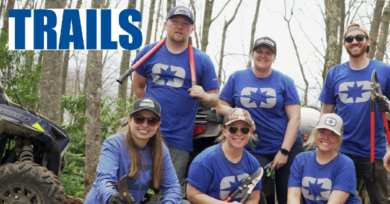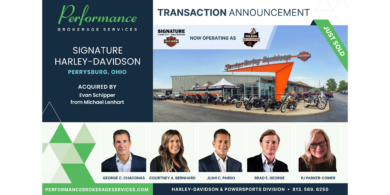Stop. Look. Listen.
 I lost a friend the other day.
I lost a friend the other day.
It’d been a few months since we last spoke, and after purposefully avoiding Facebook (I just don’t have time to look at pictures of your lunch, sorry), updates from old friends are infrequent.
He was depressed. It was obvious from our last conversation. Deep into middle-aged, my buddy discovered his life to be nowhere near where it should’ve been. His wife had left, he was stuck in a dead-end job and he’d reached a point where options were narrowing on all fronts.
But to me, he was a really amazing guy. I’d recruited him out of a metric dealership about ten years ago. He was bright, experienced, capable and aggressive — an army reservist with a strong work ethic. He had ambition beyond his parts manager job. So I hired him to be an aftermarket sales representative. Before long he was outperforming nearly everyone in the company. When the manufacturer folded, he relocated to another state, where I got him a position selling web services for motorcycle dealerships. Again, he did well, but the company didn’t, eventually shutting the territory down.
His career followed a similar pattern: one opportunity after another disintegrating, with each subsequent bounce-back having slightly lower elevation than the last. Eventually he was overqualified, underemployed and pushed into manual labor to pay the bills. Straight-commission vaporware sales are great when you’re young, but at 40-something with a family and mortgage, steady paychecks are critical. Before long, you’re the old guy staring at a dead-end job, not knowing how you got there.
When last we spoke, I half-heartedly offered him a position if he’d relocate. Although I’d wanted to hire him, I was afraid to commit too heavily. I knew he had talent, but wasn’t sure if he could recover — sometimes a downward spiral is impossible to get out of. So I threw out a cursory, “…yeah, if you find yourself relocating, gimme a call and I’ll hook you up” type of thing. I hung up the phone feeling sorry for his plight, but then I got right back to work. He killed himself a few months later.
Although I’m unsure if I could’ve prevented his death, I know without doubt that I could have done more. I was looking out for my company, my career and myself — I wasn’t looking out for my friend.
This was a guy with immense talent, potential, integrity and had proved himself capable before. Had I hired him, he could have been a rock star — or he might have failed. But I simply didn’t try; I halfheartedly felt his pain and then moved on. Meanwhile, the motorcycle industry lost a great man, and a 10-year-old lost her father.
Every business owner has stories of employees and ex-employees with personal problems, substance-abuse problems, relationship problems, psychological problems, you name it. And it’s not your job to save everyone. Your job is to make your business successful, profitable and effective. And it’s tough to be any of those things while carrying dead weight. Staff members caught in personal drama, dysfunction and addictions are poison for your business. They will rob your dealership of time, energy and customers — if not robbing you outright. Drama-fueled employees on a downward spiral will often work very hard to take others down with them, making very poor decisions up to and including theft or violence. This has a domino effect, exposing you to litigation. If that’s not enough, your ‘A’-players will leave, not wanting to deal with the dysfunction.
So what can you do? Is there a middle ground between compassion toward others and protecting your business? YES, there is. This isn’t an “either-or” question; both goals can be achieved simultaneously.
Hundreds of businesses have found that balance — helping employees, giving back to their community and taking care of those who need a little extra help — all while protecting the company first and foremost. We can extend a hand to those in need while still focusing on success; because without success, there would be no hand to extend.
Make no mistake — you’re not running a charity. Take care of your business if you expect it to take care of you. But pay attention inside and outside of your store: there are people around you who are hurting, and it may not take much to help them.
It would have cost me $300 to jump on a plane and help out my friend. I could have pulled strings to land him a great job with lots of upside potential. I could have offered advice to help him navigate his painful divorce. I could have flown him to Southern California and taken him for a ride down PCH. I could have done a lot of things. But I didn’t.
Stop, look, listen and then do something. Life, like business, is an adventure — and the ride is more fun with friends along.
Ride On,
-CC
Chris Clovis has had the honor and pleasure of 25 years in the Powersports Industry, currently serving as Vice-President of Eaglerider Motorcycles [www.eaglerider.com]. Chris’ opinions are his own, and do not necessarily reflect those of his employer, publisher, or clients. This article is dedicated to my friend’s memory: May you rest in peace and forever ride the curvy tarmac. To protect the family’s privacy, all names or details related to this true event will remain anonymous.
Contact: www.chrisclovis.com








